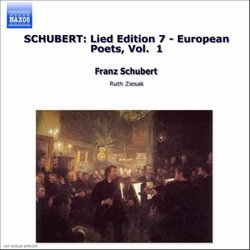| All Artists: Roman Trekel, Franz [Vienna] Schubert, Ulrich Eisenlohr, Ruth Ziesak Title: Schubert: European Poets, Vol. 1 Members Wishing: 0 Total Copies: 0 Label: Naxos Original Release Date: 1/1/2002 Re-Release Date: 7/16/2002 Genres: Pop, Classical Styles: Vocal Pop, Opera & Classical Vocal Number of Discs: 1 SwapaCD Credits: 1 UPC: 636943479520 |
Search - Roman Trekel, Franz [Vienna] Schubert, Ulrich Eisenlohr :: Schubert: European Poets, Vol. 1
 | Roman Trekel, Franz [Vienna] Schubert, Ulrich Eisenlohr Schubert: European Poets, Vol. 1 Genres: Pop, Classical
|
Larger Image |
CD Details |
CD ReviewsExploring the Schubert Songs -- Ossian and Scott Robin Friedman | Washington, D.C. United States | 01/04/2005 (4 out of 5 stars) "One of the joys of exploring the Schubert songs in detail results from the intermingling of the familiar with the new. Thus, this CD, part of the Naxos project of recording the complete Schubert lieder, features one of Schubert's most familiar songs together with many songs that are little-known but worth hearing. The album is titled "Schubert: European Poets, Vol. 1" and the performers are Ruth Ziesak, soprano, Roman Trekel, baritone, and Ulrich Eisenlohr, piano. Ms. Ziesak has a particularly lovely voice. The CD consists of 14 songs, six by James McPherson (1736-1796) in his "Ossian" poems and eight by Sir Walter Scott (1771 -- 1832).
The familiar song on this CD is from a group that Schubert set late in his life to poetry by Sir Walter Scott: Ellen's Song III, Hymn to the Virgin, D. 839, from "The Lady of the Lake." This song is more commonly known as "Ave Maria.", Ms. Ziesak sings it with beauty and simplicity accompanied by the ringing triplets of Mr Eisenlohr on the piano. Schubert was not conventionally religious but was able to capture the simplicity and beauty of faith in this beautiful lied. In contrast to the "Ave Maria", many of the songs on this CD will probably be unfamiliar. These settings show the importance to Schubert of the romantic imagination -- of the unfamiliar, the old, kings, castles, medieval combat, courtly love, and the broken heart. The Ossian poems kindled a romantic revival in Europe, as a reaction to the Enlightenment, and Scott's popular writings contributed greatly to the growth of romanticism. They deeply influenced Schubert. It is valuable to hear how Schubert's style changes between the early "Ossian" songs and the Scott songs. The former songs are in the form of ballads. They are diffuse, thorough-composed and offer a mixture of operatic and folk-elements. Most of them are lengthy. There is beautiful music in these songs, but the lengthier ones, for me, sometimes fail to hang together. The Scott songs, in contrast, show Schubert at his best. These songs are tightly composed with music that amplfies for the listener the message of the poetry. In particular Schubert has developed the use of the piano as a partner in his songs. In many of the Scott songs, the piano plays a short repeated figure which sets the tone for the flowing vocal line. "Ave Maria" does this with its rising triplet figures, but each of the other Scott songs does so as well. In addition to "Ave Maria", I particularly enjoyed the first "Ellen's Song", D837, with its lyrical, rocking, lilting theme, the romantic song of lost love, the "song of Anne Lyle, D. 830, and the "Norna's Song" D. 831, with its mysterious, brooding accompaniment in the piano. This CD presents a mix of familiar and unfamiliar Schubert, and of young Schubert and mature Schubert. It shows the importance the romantic movement had to Schubert's songs. This CD will help the lover of Schubert explore his beautiful songs." |

 Track Listings (14) - Disc #1
Track Listings (14) - Disc #1